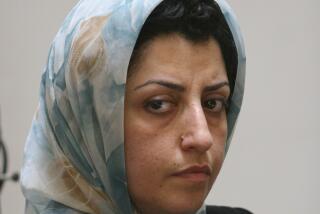Why Is This Man Banned?
- Share via
Islamist royalty. Terrorist sympathizer. Anti-Semite. Double-talker. These are just a few of the accusations made against Tariq Ramadan, the 42-year-old Swiss-born philosopher and activist who is one of the best-known figures in European Islam.
He’s a public intellectual with a popular following, and his articles and lecture tapes sell briskly in Europe’s impoverished immigrant neighborhoods. He’s become a touchstone for controversy, which erupted most recently in July, when the State Department revoked his visa without comment just before he was to begin a prestigious teaching position at Notre Dame.
There’s a reason Ramadan gets treated like a radical: He is one.
Ramadan argues that liberal Western societies need to respect Muslims’ religious and individual rights under European law at a time when growing Muslim immigrant populations are confronting European governments concerned about cultural change and terrorist attacks. Critics call it a form of separatism, in which Muslims enjoy the benefits of European law but not its obligations.
But for Ramadan, who calls himself “radical in a good sense,” rights exist within a universal framework of common citizenship. Because of this, he has criticized Muslims’ “unhealthy victim mentality” and urged them to “go out from their ghettos” and engage in interfaith politics.
“Some Muslims think I’m ‘Westernizing Islam,’ and my non-Muslim detractors accuse me of double talk and dishonesty,” he said. “Those who like my ideas commend my efforts but tell me I’m alone in this, while those who fear my work warn people that I have a ‘great following.’ ”
Ramadan’s enemies are not only on the Western or Islamic right. Some European leftists criticize him for not being sufficiently socialist, secular or gay-friendly.
One persistent claim: Ramadan -- whose brother has defended the stoning of adulterous women and whose grandfather founded the Muslim Brotherhood, the first modern Islamist movement -- supports Islamic terror. Ramadan has repeatedly denied this and has publicly broken with his brother’s interpretation of Islamic law. Yet the family tree is troubling to U.S. policymakers.
Last week, as Vice President Dick Cheney and Defense Secretary Donald Rumsfeld flew to Kabul for the inauguration of Afghan President Hamid Karzai, Ramadan was still in Geneva, waiting to hear about his visa application.
That’s life at the center -- the “radical middle” -- of the battle raging within European Islam.
As Ramadan told Foreign Policy magazine last month, “I am a symbol of what’s coming, a new generation of Muslim leaders -- men and women -- able to speak English as you are speaking English and French as they do in France. They are European, they are American, and they are going to speak for themselves.”
More to Read
Sign up for Essential California
The most important California stories and recommendations in your inbox every morning.
You may occasionally receive promotional content from the Los Angeles Times.










